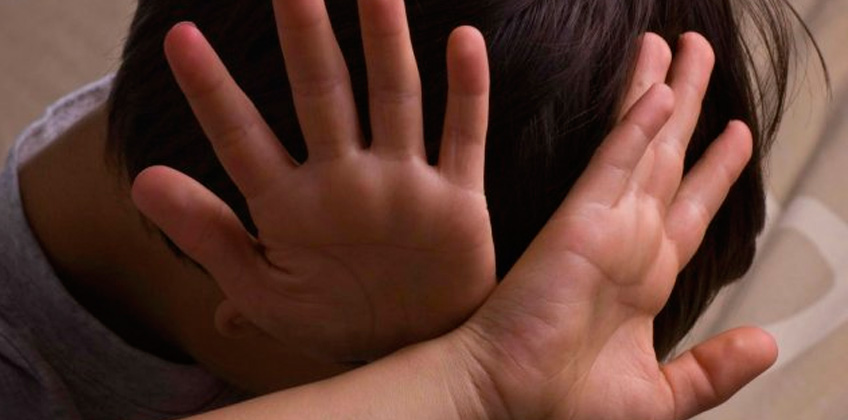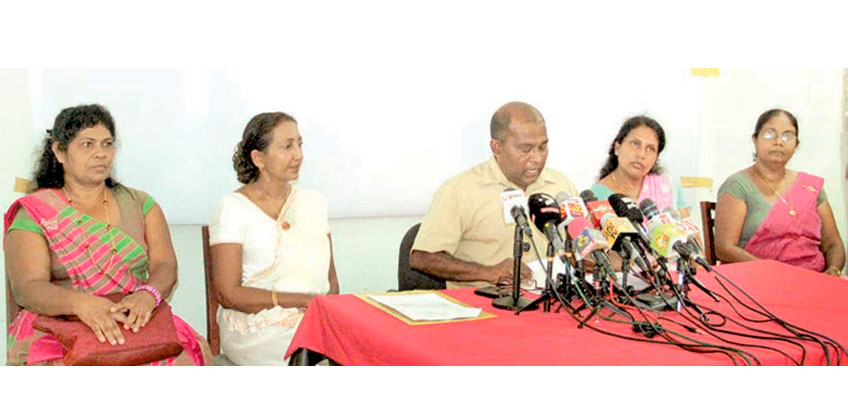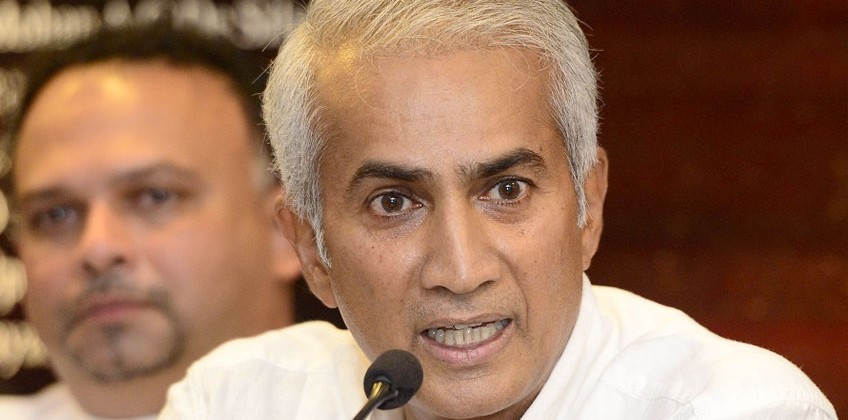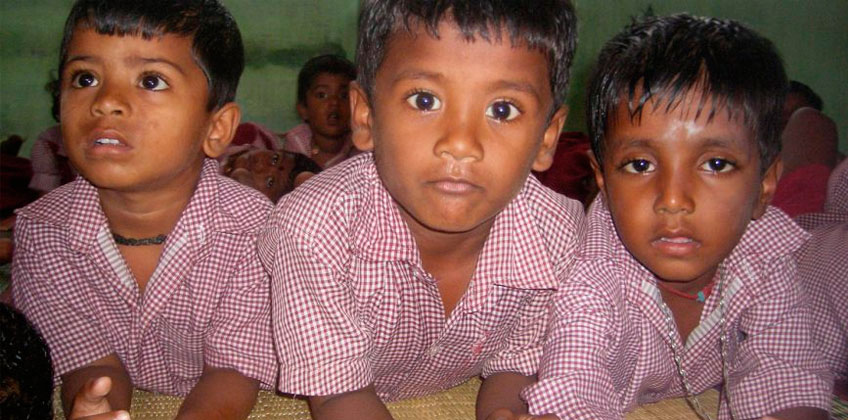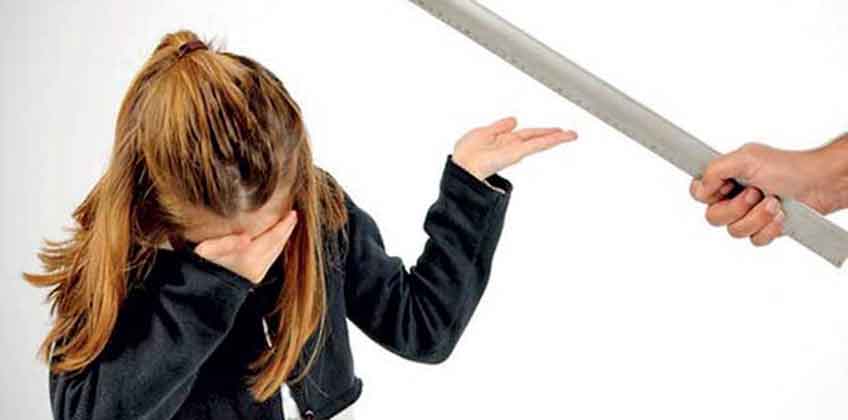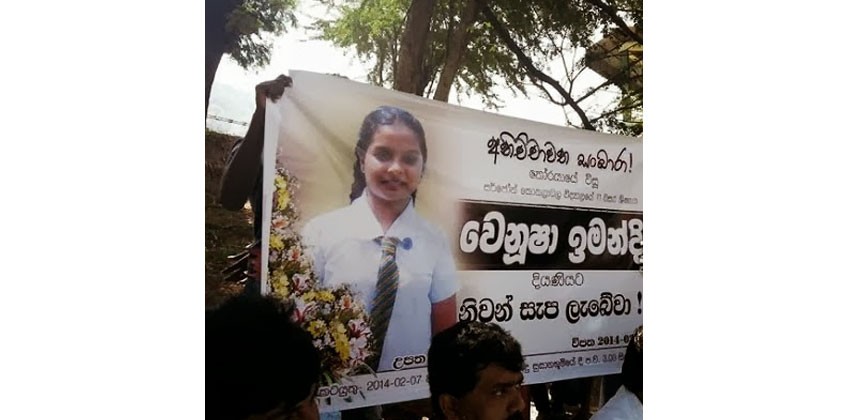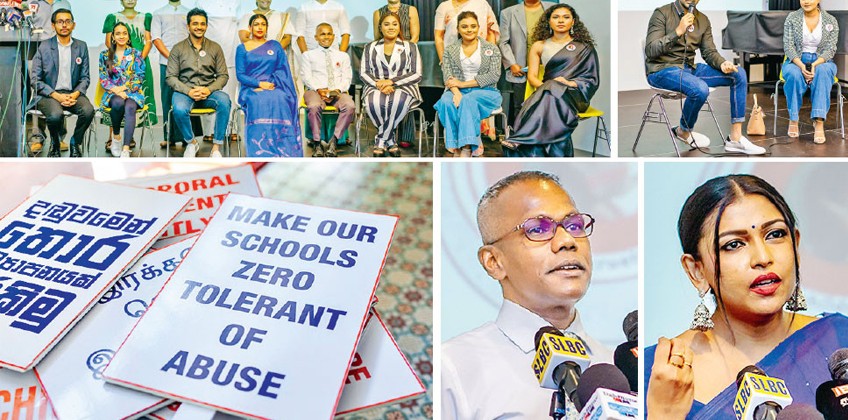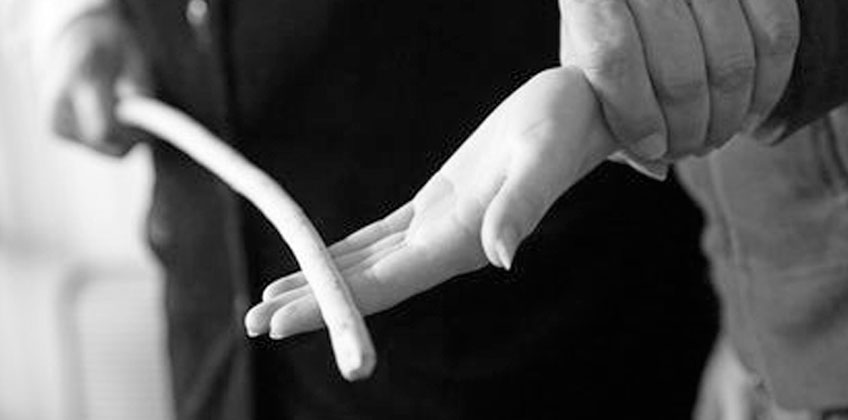
It is rather unclear as to when and why certain lies began to be accepted as truth in Sri Lankan Society concerning Corporal Punishment when it seems to be fairly obvious that it is an abomination. It is equally galling as to why a conference needs to be held to help some people understand that it is wrong hitting a child. However, that is the reality and that is why a conference needs to be held to highlight the obvious. What is obvious is that Pain is NOT an expression of love. Pain is NOT a form of love.
The reason why Corporal Punishment exists is that there are teachers and family members out there who are angry and frustrated and they take it out on the children. The children grow up from victims to offenders and they, in turn, take out their anger on children. Children grow up thinking that to teach you to need to cause pain. This applies to both the male and female gender. Tragically young girls who find themselves in an abusive relationship with a man may think that she is being beaten out of love. The males, of course, may develop other issues that result in violence.
In domestic violence involving children, the child identifies the father as the authoritarian and when father hits mother the child automatically believes that is the correct thing to do, said Professor of Obstetrics and Gynecology, Member of UGC, Hemantha Senanayake at the Media Conference reviewing the “Progress for Real Change - Zero Tolerance on all forms of Violence”. The conference was aimed at putting an end to Corporal Punishment.
Professor Senanayake added: “They think this is the norm. When the child enters school he or she faces more violence at the hands of the teacher or Principal. Again the child perceives that the teacher is the authoritarian and feels – ‘the teacher has the right to hit me’. One question I get most often from the offenders is ‘We are hitting the child out of love what is wrong with that?’. I wish to make it clear that I think this has nothing to do with love,” said Senanayake.
What is alarming is that School Prefects are given permission to hit younger children. This is because it has become the norm. The prefects are told that it is right to hurt. The prefects, in turn, say – ‘We were physically punished as children, so why can’t we do the same when we are in authority? They cannot discern right from wrong.
Traumatic experience
Senanayake during his address made a connection between sexual harassment of women and the issue of Corporal punishment because of the traumatic experience these students experience.
“We need to stand up for these children. Break the cycle. Children who experience abuse from schools, families and bullying at the hands of other children are more likely to become toxic people. This is not right because the child suffers and exhibits disruptive and violent behaviour. I feel the offenders also need to be rehabilitated and made knowledgeable,” explained Senanayake.
Stop Child Cruelty, Chairperson, Dr. Tush Wickramanayaka said Sri Lanka ratified the United Nations Convention on the Rights of the Child (UNCRC) in 1992. Corporal punishment is defined by the United Nations Committee on the Rights of the Child (UNCRC) as: “any punishment in which physical force is used and intended to cause some degree of pain or discomfort, however light”.
“It goes on to say that corporal punishment involves, verbal abuse, hitting/slapping the child with the palm or more violent action with an instrument such as a cane or baton, and even brooms and similar implements which can inflict severe pain. But it could also involve other techniques such as pinching, pulling the hair or making the student kneel down or stand up. In the short term, in addition to physical harm there is also a significant degree of humiliation and mental hurt,” said Wickramanayaka.
She went on to say that we cannot measure corporal punishment as little or severe. It is completely inappropriate.
“The Stop Child Cruelty has formulated a Pentagon Proposal - The Pentagon Proposal unites five stakeholders of Government - President, Ministry of Education, Ministry of Children’s Affairs, Law and Order and Justice in making meaningful and permanent solutions. This has been formulated to bring swift justice to the child without any delay and done in a manner which is efficient. Here I wish to stress that the law must be effective and it must be executed properly,” explained Wickramanayaka.
She also stressed that our beliefs and notions have to change if we are to win the battle against Corporal Punishment. Teachers, parents and children need to change their beliefs.
“This is not to say that there should be NO discipline when the child does something wrong. But we have to examine possible solutions to correct the child without using physical force and this is something we are working out with the Ministry of Education. We have to take positive action,” said Wickramanayaka.
She stated that they have been holding talks with the National Child Protection Authority to take this to Parliament (National C hild Protection Policy). Wickramanayaka said that satisfactory progress is being made, and she is very enthusiastic about a positive outcome for the children of Sri Lanka. She said that there is a circular (2016) issued by Ministry of Education, that says that it is against the law to beat children. This circular needs to go to all schools.
hild Protection Policy). Wickramanayaka said that satisfactory progress is being made, and she is very enthusiastic about a positive outcome for the children of Sri Lanka. She said that there is a circular (2016) issued by Ministry of Education, that says that it is against the law to beat children. This circular needs to go to all schools.
“In foreign countries, wherever there are children, there are child protection officers. He/she is there to protect the children and knows what to do. They have to be specially trained. Lastly, I wish to say that children need to be empowered with knowledge and that knowledge is that no one has the right to hit them,” said Wickramanayaka.
Parent Lalith Senanayake experienced a nightmarish incident recently concerning his child. He related the traumatic incident at the media conference.
“I am the father of a child who faced corporal punishment and it has left my child shattered. Such is my child’s trauma that the child is now under psychiatric treatment. The child was injured physically and had to experience degrading treatment. We went to the police and my poor child had to relive the experience again. Now, my child who once was full of life is now in a terrible state having lost all faith in humanity. I do not want this to happen to anyone again. My 13-year-old child was beaten badly at school to the point of injury,” said Senanayake.
Senanayake stressed that this culture of fear and intimidation has made his child a victim with the perpetrators thinking that they are not to be blamed. He feels that the police can play a role here. Because they think that Pain is a form and expression of love. There are laws but their personal opinion stands in the way. Some officers need to understand that no one is above the law.
“Now my child is experiencing insomnia and cannot eat or drink properly. My child experiences nightmares. Where is the justice for my child? The Principal threatened me saying that if the child returned to school my child would be severely punished!
Emeritus Professor of Law and former Vice Chancellor of the University of Colombo Savithri Gunasekara said the anguish of a parent is immense.
“UNICEF sponsored a major piece of research which indicated that Corporal Punishment at school is one of the major areas of child abuse. We have spoken about this for 30 years with no proper action, and if this programme can do something it will be a great achievement,” said Gunasekara.
She highlighted that a major area of concern for her is that while there is a system of law in the country why do such horrific cases of child abuse take place?
“In Buddhism, in the Sigalovada Sutta, it has been outlined how children are disciplined. And it is not through corporal punishment. It is done through proper speech. The child should be spoken to compassionately. There was a time when Sri Lankan society upheld these values. Robert Knox has said about Sri Lankans that ‘their anger does not last long. Seldom do they beat even a slave’. In ancient Sri Lankan society such values were given great priority,” explained Gunasekara.
State and family responsibility
Gunasekara had a powerful message for us all. And that is that we tend to dismiss law because we see weaknesses in implementation. When we see weaknesses and inadequacies in implementation, we think what is the use of the law? But the point is that the law has a role in society. And it is a failure of the law in the society and the state and the family to coordinate responses that have led to the legitimization of violence.
“The state and family need to take responsibility for the child. If such an environment is not created the child becomes a victim of abuse. We must never lose faith in the system of law because a system of law is essential in a country. It facilitates good morals. The concept of legitimacy of beating children whether in school or at home, came through the British Colonial Lawmaking. Those thoughts were in the British Law and this was transferred to Sri Lankan law – whipping is appropriate punishment. Gradually this became accepted by Sri Lankan society. However in 1994, there was a serious effort to change the laws,” pointed out Gunasekara.
Senior Lecturer in Psychiatry, Faculty of Colombo, Dr. Chathuri Suraweera stated that child abuse is not given enough attention the way female rights and animal rights are given prominence.
“However spare a thought for the teacher who needs to control 30 – 40 students in the class. There are options, however. A child need not be beaten. A teacher cannot give more of her/ his time to an individual student because there are so many children. Some children are very naughty. They are impulsive and emotional. One proposal I wish to state is increasing the number of teachers in the classroom like in other countries. We also need to examine whether the child has learning disabilities,” said Suraweera.
A child can come from a background where someone in the family is alcoholic or aggressive. What we need is positive parenting. We need to make the family a place of protection. If the child does not undergo harm from family members the child will not exhibit disruptive behaviour in the classroom.
“The child needs to be associated with peaceful forms of expression such as aesthetics, music and outside interests. Reading books can help the child form a well-rounded personality. I also feel that the child should not be pressurized to achieve certain goals. The family and teachers need to change their approach. But the most important solution is giving them LOVE and TIME,” explained Suraweera.


